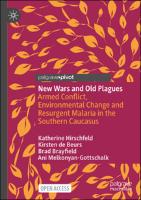New Wars and Old Plagues
Armed Conflict, Environmental Change and Resurgent Malaria in the Southern Caucasus
Author(s)
Hirschfeld, Katherine
de Beurs, Kirsten
Brayfield, Brad
Melkonyan-Gottschalk, Ani
Language
EnglishAbstract
This Open Access book uses Mary Kaldor’s concept of “New Wars” to explore how ethnic conflict reshaped the social and environmental landscape of the Southern Caucuses following the collapse of the Soviet Union. It relies on remote sensing data and qualitative historical research to explore how armed conflict between non-state actors generated the region’s largest epidemic of P. vivax malaria since the 1960s. This book is an important addition to the literature on the Karabakh conflict and conflict studies more broadly because the infectious disease outbreaks associated with warfare often kill more people than the armed conflicts themselves. Warfare itself has also changed dramatically since the collapse of the USSR, and the Karabakh conflict provides an excellent case study of the way “New Wars” transform the natural and social environment to facilitate outbreaks of preventable disease. This extended case study will be useful to researchers from a variety of academic disciplines, including medical anthropology, geography, conflict studies, disease ecology, global health and public health. It also reveals the fragility of twentieth century malaria control in temperate regions and will assist in predictive modeling for future outbreaks.
Keywords
Armed conflict; Malaria; Medical anthropology; Emerging infectious diseases; Disease ecology; Karabakh; Caucasus; Remote sensing; Medical geography; Post-Soviet history; Warfare; Non-state actorsDOI
10.1007/978-3-031-31143-7ISBN
9783031311437, 9783031311420, 9783031311437Publisher
Springer NaturePublisher website
https://www.springernature.com/gp/products/booksPublication date and place
Cham, 2023Grantor
Imprint
Palgrave MacmillanClassification
Human biology
Anthropology
Public health and preventive medicine
International relations
Human geography
General and world history


 Download
Download Web Shop
Web Shop